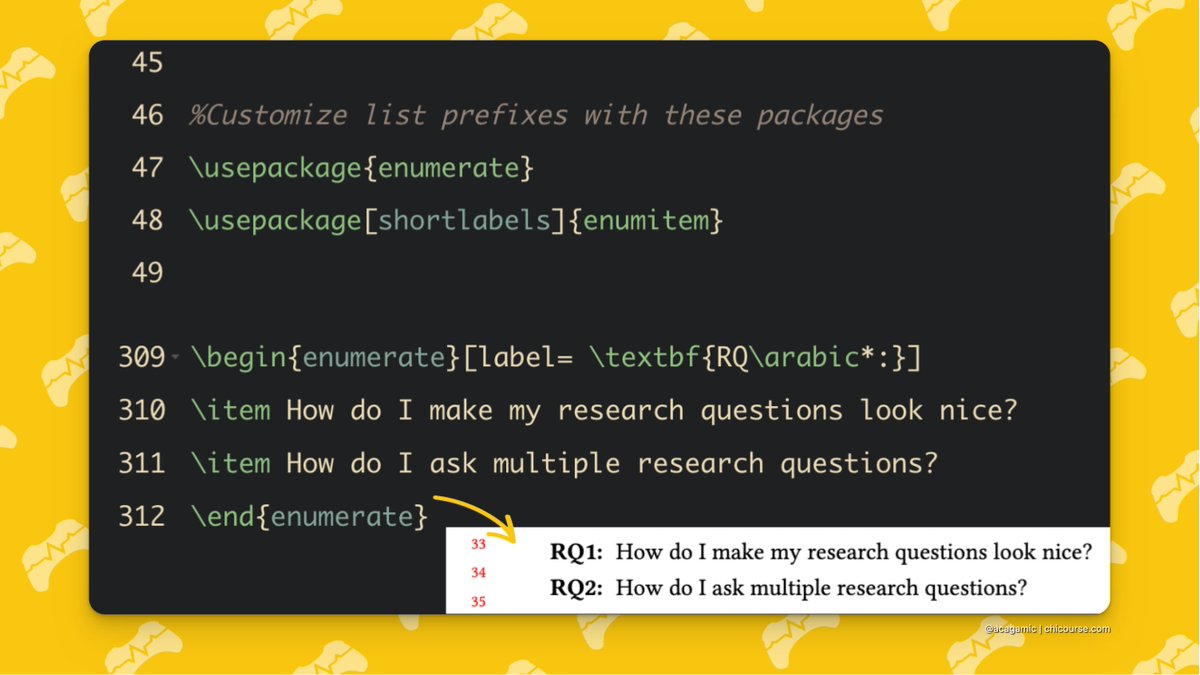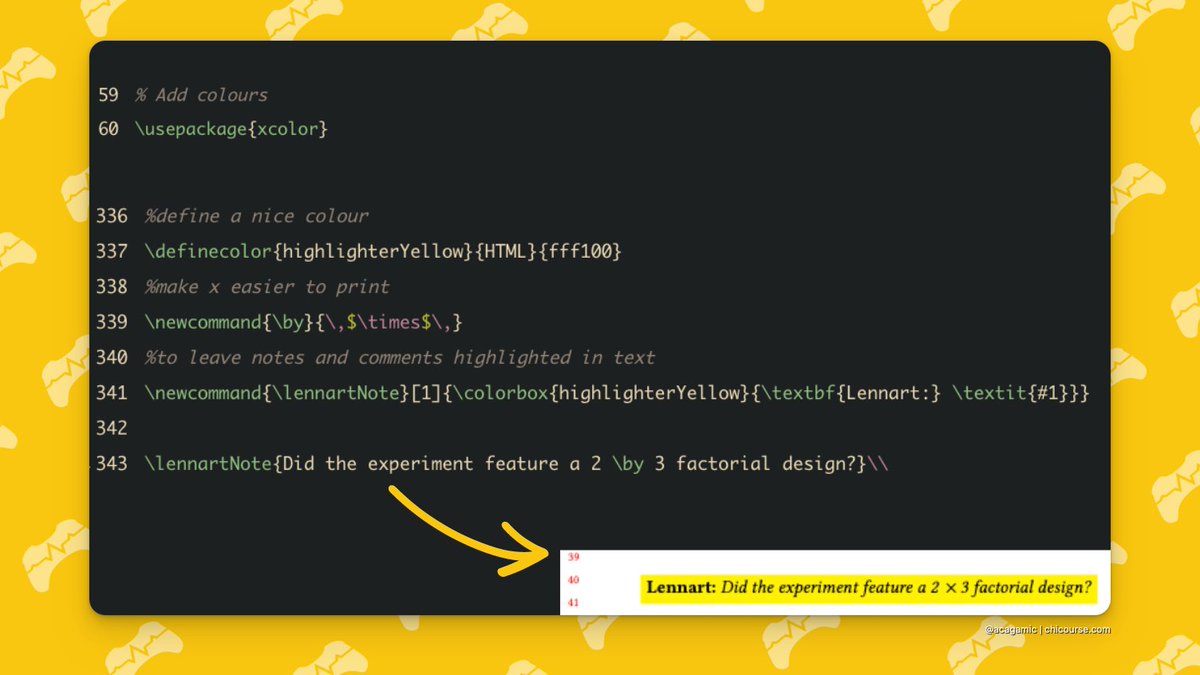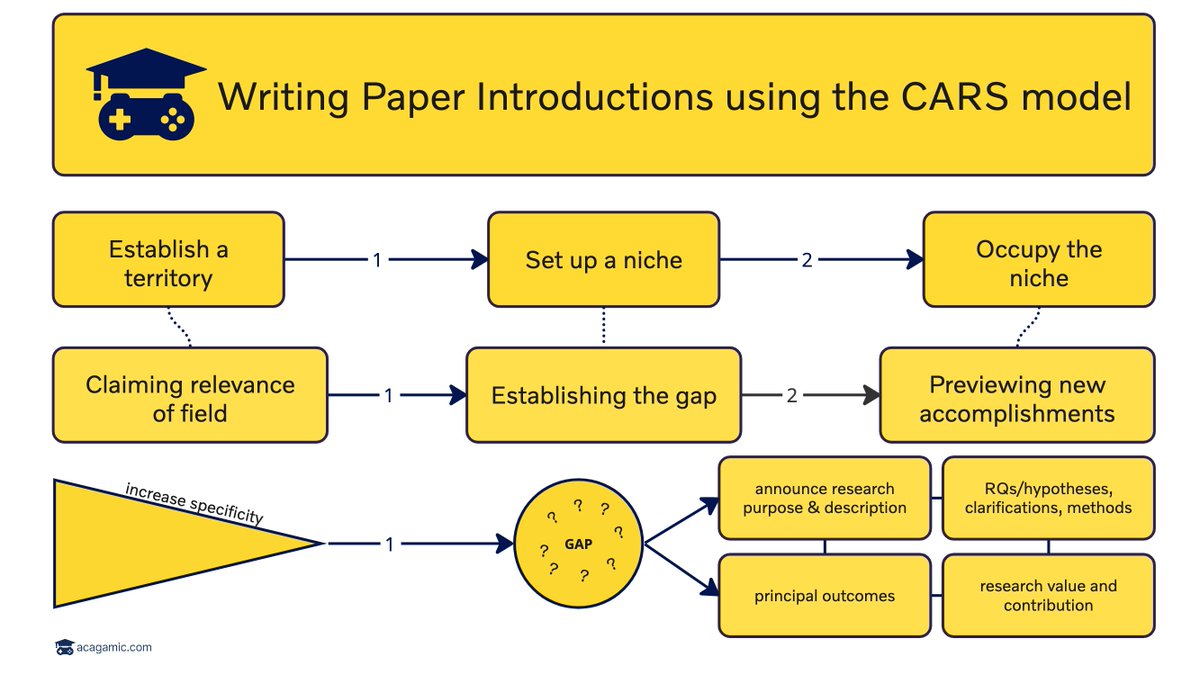Supercharge your paper submissions with 5 powerful LaTeX snippets.
I've perfected them in 10,000+ hours of coding.
Unlock the secret to lightning-fast paper editing. ↓
I've perfected them in 10,000+ hours of coding.
Unlock the secret to lightning-fast paper editing. ↓

1. Use the right documentclass options before submitting your paper to CHI
How it works:
- Comment out this line of code with % \documentclass[sigconf,authordraft]{acmart}
- Then add \documentclass[manuscript,screen,review, anonymous]{acmart}
This is the right review format.
How it works:
- Comment out this line of code with % \documentclass[sigconf,authordraft]{acmart}
- Then add \documentclass[manuscript,screen,review, anonymous]{acmart}
This is the right review format.

2. Format nicer-looking research questions
How it works:
Load in LaTeX doc header:
\usepackage{enumerate}
\usepackage[shortlabels]{enumitem}
Type in LaTeX doc body:
\begin{enumerate}[label= \textbf{RQ\arabic*:}]
\item x
\end{enumerate}
How it works:
Load in LaTeX doc header:
\usepackage{enumerate}
\usepackage[shortlabels]{enumitem}
Type in LaTeX doc body:
\begin{enumerate}[label= \textbf{RQ\arabic*:}]
\item x
\end{enumerate}

3. Make sure to always define acronyms before use
How it works:
Load in LaTeX doc header:
\usepackage[nolist]{acronym}
Define acronyms:
\begin{acronym}
\acro{ANOVA}{Analysis of Variance}
\end{acronym}
Write the acronym in your text like this:
"We conducted an \ac{ANOVA}."
How it works:
Load in LaTeX doc header:
\usepackage[nolist]{acronym}
Define acronyms:
\begin{acronym}
\acro{ANOVA}{Analysis of Variance}
\end{acronym}
Write the acronym in your text like this:
"We conducted an \ac{ANOVA}."

4. Create pretty quotes for qualitative findings
How it works:
Define a new command called \quoting:
\newcommand{\quoting}[2][P]{``\emph{#2}''\emph{[\textbf{#1}]}}
Use the command like this to quote participants:
\quoting[P13]{This prototype rocked my world.}.
How it works:
Define a new command called \quoting:
\newcommand{\quoting}[2][P]{``\emph{#2}''\emph{[\textbf{#1}]}}
Use the command like this to quote participants:
\quoting[P13]{This prototype rocked my world.}.

5. Leave highlighted comments
How it works:
Load in LaTeX doc header:
\usepackage{xcolor}
Define:
\definecolor{highlighterYellow}{HTML}{fff100}
\newcommand{\lennartNote}[1]{\colorbox{highlighterYellow}{\textbf{Lennart:} \textit{#1}}}
Use:
\lennartNote{My nice comment}
How it works:
Load in LaTeX doc header:
\usepackage{xcolor}
Define:
\definecolor{highlighterYellow}{HTML}{fff100}
\newcommand{\lennartNote}[1]{\colorbox{highlighterYellow}{\textbf{Lennart:} \textit{#1}}}
Use:
\lennartNote{My nice comment}

TL;DR: 5 drops of my secret LaTeX sauce to write smooth #chi2023 papers
1. Use the right documentclass options for submission
2. Format nicer-looking RQs
3. Always define acronyms before use
4. Create pretty quotes for qualitative findings
5. Leave highlighted comments
1. Use the right documentclass options for submission
2. Format nicer-looking RQs
3. Always define acronyms before use
4. Create pretty quotes for qualitative findings
5. Leave highlighted comments
Done like disco.
If you enjoyed this thread:
1. Follow me @acagamic for more tips on writing research papers
2. Join more than a thousand people on my newsletter (link in profile).
If you enjoyed this thread:
1. Follow me @acagamic for more tips on writing research papers
2. Join more than a thousand people on my newsletter (link in profile).
https://twitter.com/acagamic/status/1643650509905985548
• • •
Missing some Tweet in this thread? You can try to
force a refresh

 Read on Twitter
Read on Twitter




